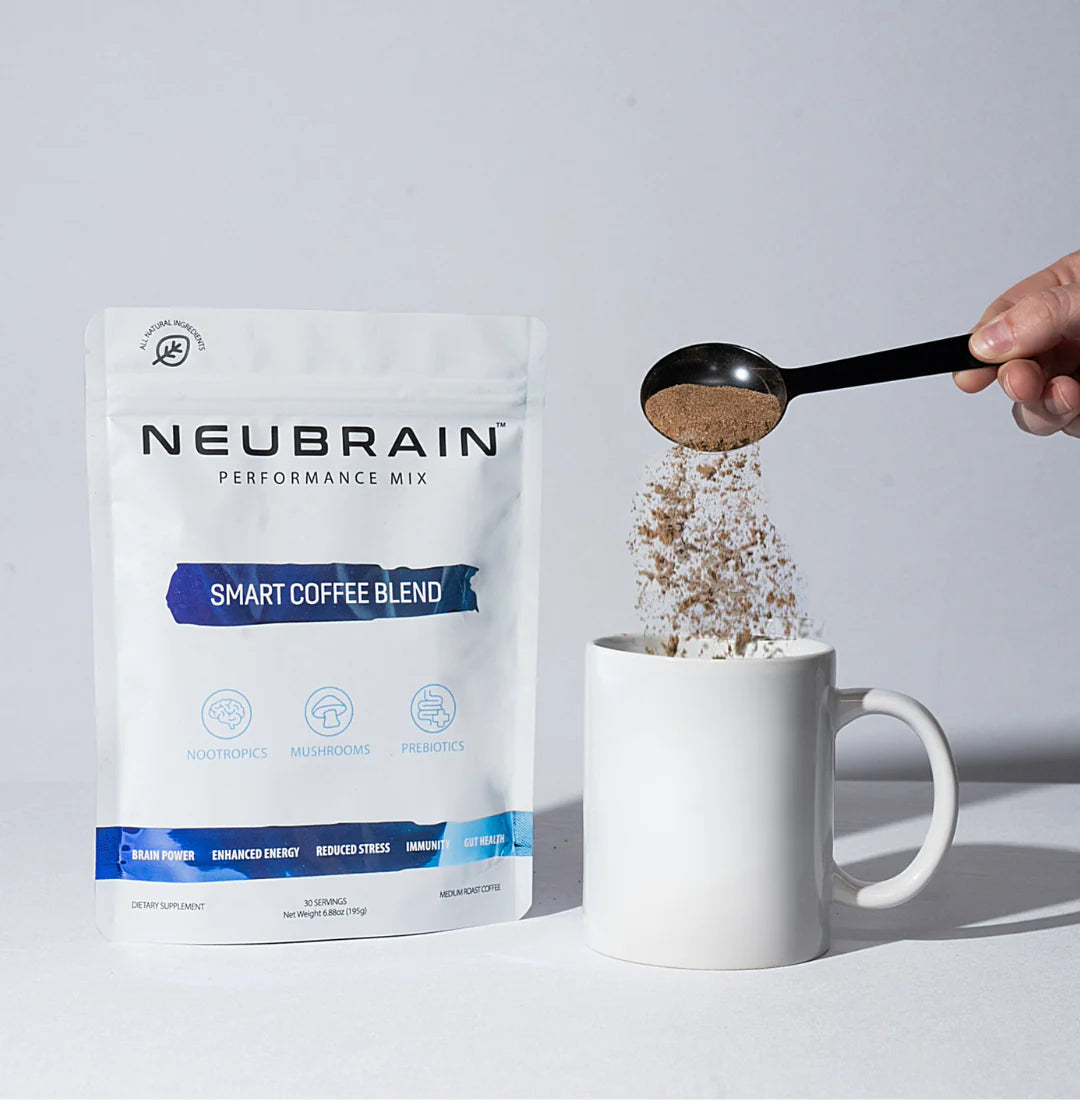Coffee is one of the world's most beloved beverages, cherished for its ability to invigorate our mornings and fuel our afternoons. But beyond its reputation as a go-to energy booster, coffee holds a lesser-known but equally impressive benefit: it can be good for your gut health.
In recent years, scientific research has begun unravelling the complex relationship between coffee and our digestive system. While many people associate coffee with its stimulating effects on the brain, this popular drink also interacts with our gut in various beneficial ways.
From promoting a healthy gut microbiome to aiding in digestion, coffee's impact on our digestive health is profound and multifaceted.
In this blog post, we'll explore the evidence-based benefits of coffee for gut health, exploring how your daily cup of joe might be doing more than just waking you up.
What is Gut Health?
Gut health refers to the balance and function of the microorganisms living in our digestive tract. These microorganisms, often called gut flora or gut microbiota, play a crucial role in digesting food, absorbing nutrients, and maintaining your overall well-being.
A healthy gut contributes to a strong immune system, heart health, brain health, improved mood, and effective digestion. Conversely, an imbalance in gut flora can lead to issues like bloating, indigestion, and more serious health problems.
Maintaining gut health involves eating a balanced diet rich in fiber, probiotics, and prebiotics, staying hydrated, and managing stress. Understanding and caring for your gut health is essential for your overall health and happiness.
7 Amazing Benefits of Coffee for Your Gut Health
Here are the scientifically approved benefits of coffee for your gut health.
1. Enhanced Intestinal Barrier Function
Coffee's potential to enhance intestinal barrier function lies in its rich composition of bioactive compounds, such as polyphenols, melanoidins, and dietary fiber.
According to the article in Nutrients, “These components are crucial in fortifying the gut lining and maintaining its integrity”.
Potent Antioxidant and Anti-inflammatory Properties
The major components of polyphenols contain chlorogenic acids, which are known to have antioxidant and anti-inflammatory effects.
They are beneficial in eliminating free radicals and decreasing oxidative stress, which in turn can negatively affect the intestinal barrier.
Also Read: The Top 5 Benefits of Chaga Mushrooms
These compounds help maintain the intercellular tight junctions in epithelial layers, which provides a strong barrier in the intestine.
The melanoidins formed during the roasting of coffee also play a crucial role in the gut’s health. They possess prebiotic qualities, which means they help encourage the growth of friendly bacteria in the gut.
Healthy microbiota, on the other hand, produces SCFAs, including butyrate, which is important in feeding the colonocytes and strengthening the gut barrier.
Butyrate is a vital SCFA produced by a commensal microbiota and is also utilized by colonocytes as an energy source.
Due to endotoxin exposure, chronic inflammation compromises the gut barrier and induces a pro-inflammatory phenotype in intestinal epithelial cells.
2. Alleviation of Gastroesophageal Reflux Disease (GERD) Symptoms
Coffee is usually believed to worsen the symptoms of GERD; however, moderate coffee intake has a positive impact on these symptoms. Specifically, dewaxed coffee also reduces the discomfort associated with GERD.
GERD is occasioned by the reflux of stomach acid into the esophagus, triggered mostly by the relaxation of the lower esophageal sphincter (LES).
Several studies establish that caffeine and chlorogenic acids, which are traces in coffee, affect the performance of LES. These compounds prevent the relaxation of the lower esophagus, and this is the ES, which is a muscle that forms a barrier to the stomach.
As this tightly closed LES minimizes the inflammatory process and acid degradation, coffee lowers the risk of GERD episodes and their symptoms.
- Heartburn
- Regurgitation
- Chest pain
- Difficulty swallowing
- Chronic cough
- Hoarseness
- Nausea
NOTE: Coffee's effects on GERD can vary among individuals, depending on factors such as sensitivity to caffeine and dietary habits.
3. Modulation of Gut-Brain Axis
These interactions relate to how caffeine and other bioactive compounds in coffee affect the gut-brain axis, which includes the neural and humoral signalling that links the gut and the brain.
This two-way communication network between the intestines and the brain is referred to as the gut-brain axis and is essential for gut and brain health.
Melanoidins, formed during the roasting process of coffee beans, are a significant component with health benefits. These complex compounds have antioxidant and anti-inflammatory properties, to protect the gut lining and support a healthy microbiota.
Melanoidins bind to toxic substances in the gut, reducing their absorption and promoting detoxification.
Coffee's effect on the gut microbiota can further influence the gut-brain axis. A healthy balance of gut bacteria is essential for optimal production of metabolites like short-chain fatty acids (SCFAs), which maintain the integrity of the gut lining and modulate inflammation. These metabolites also have signalling functions that affect brain function.
4. Protection Against Gut Infection
Coffee's protective effects against gut infections are attributed to its rich content of antimicrobial compounds.
- Polyphenols (chlorogenic acids)
- Diterpenes (cafestol and kahweol)
These bioactive substances exhibit antimicrobial properties that can inhibit the growth of harmful bacteria and pathogens in the gastrointestinal tract.
Polyphenols in coffee disrupt bacterial cell membranes and interfere with the energy production processes of pathogens, thereby reducing their viability.
This action is particularly effective against common gastrointestinal pathogens such as E. coli and Salmonella, known to cause foodborne illnesses and other digestive infections.
The antimicrobial properties of coffee extend to promoting a healthier balance of gut microbiota. It suppresses the growth of harmful bacteria, and coffee creates a more favorable environment for beneficial bacteria, such as Bifidobacteria and Lactobacilli, to thrive.
This balance is crucial for maintaining a robust immune response within the gut, which is the body's first line of defense against infections.
5. Regulation of Appetite Hormones
Coffee's influence on appetite regulation is primarily mediated through its effects on the hormones ghrelin and leptin.
- Ghrelin, often referred to as the "hunger hormone," is produced in the stomach and signals the brain to stimulate appetite.
- Leptin, known as the "satiety hormone," is produced by adipose (fat) cells and helps to signal fullness and suppress appetite.
Research published in the Journal of “Foods” indicates that coffee consumption affects the levels of these hormones in a way that promotes satiety and controls appetite.
Specifically, caffeine, the primary active component in coffee, has been shown to decrease ghrelin levels, reducing the sensation of hunger.
At the same time, it has been shown that coffee can amplify the actions of leptin and this has the potential to cause shifts in appetite and therefore food consumption.
Hormonal regulation of food intake also has a positive effect on the gastrointestinal system because it helps maintain proper appetite and food intake. The coffee has an impact on weight management by helping to control appetite.
6. Improved Gallbladder Function
Research indicates that moderation in coffee intake enhances the gallbladder's functioning as it encourages it to contract muscle and discharge bile.
Bile is a greenish-yellow substance secreted by the liver into the small intestine to aid in digesting fats and absorption of fats and fat-soluble vitamins.
Caffeine and other bioactives influence the ability of the gallbladder to contract more frequently and with improved efficacy. This increased activity helps in the safe discharge of bile into the small bowel to further emulsify ingested fats.
Caffeine, therefore, prevents bile stagnation by ensuring that the gallbladder is regularly and efficiently emptied. Due to stagnant bile, cholesterol starts to accumulate and solidify, thus contributing to the formation of gallstones.
Hence, moderate and consistent coffee consumption helps decrease the risk of cholesterol gallstone formation.
7. Enhances Gut Microbiota
The impact of coffee on gut microbiota can be attributed to the bioactive chemicals that modulate the composition and function of the gut microbial community.
Chlorogenic acids and quinides in coffee, which are polyphenols, exhibit prebiotic effects, stimulating the development and function of favorable microbes in the colon.
These compounds act as a food base for beneficial bacteria such as Bifidobacteria and Lactobacilli, which are known to possess health benefits. They feed these beneficial microbes to help them grow well and reside in the gut.
Thus, we can determine that coffee has an antimicrobial effect that slows down the development of pathogenic bacteria to preserve the balance of microorganisms in the intestines.
This could also reduce the chances of dysbiosis, an abnormal condition that results in a shift of the balance of microbes that is linked to many GI diseases.
In the International Journal of Food Microbiology, the authors identified a study that shows that moderate use of instant coffee leads to a higher amount and activity of Bifidobacterium spp.
That can persistently colonize in the human intestine with little apparent effect on the remainder of the microbiota.
FAQs
Can all types of coffee affect gut microbiota?
Yes, all types of coffee can affect the gut microbiota. Both regular and decaffeinated, like mushroom coffee, contain compounds that can influence the balance and activity of gut bacteria, potentially offering benefits such as enhanced digestion and improved gut health.
How often should I drink coffee for a healthy gut?
For a healthy gut, moderate coffee consumption—about 1 to 2 cups per day—can be beneficial. It’s important to listen to your body and adjust your intake if you experience any digestive discomfort.
Is decaffeinated coffee better for gut health?
Decaffeinated coffee can be easier on the gut for some people, as it reduces the potential for caffeine-related digestive issues while still offering beneficial compounds that promote gut health.
Can Coffee Clear Your Bowels?
Taking coffee has an effect on colonic movements and thus helps people who have a problem with constipation due to the caffeine present in it. However, it is not always effective, and its use should be limited because it could lead to addiction or indigestion.
The Bottom Line
So, when consumed in moderation, coffee can be beneficial for gut health. Whether you prefer regular or decaffeinated coffee, both can contribute beneficial compounds that support a healthy gut microbiota.
For an even healthier option, consider trying mushroom coffee, which combines the benefits of traditional coffee with the added advantages of medicinal mushrooms known for their gut-friendly properties.
Explore our selection of premium mushroom coffees to enhance your daily routine and support your gut health.








